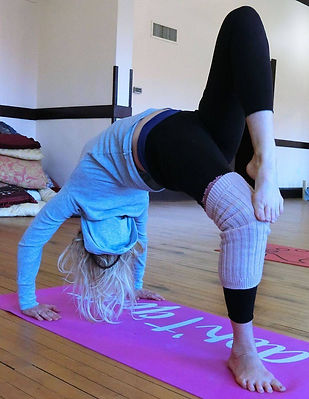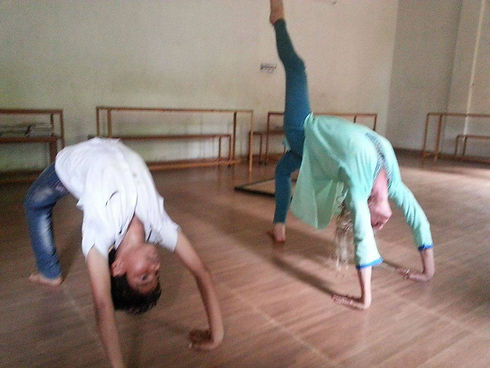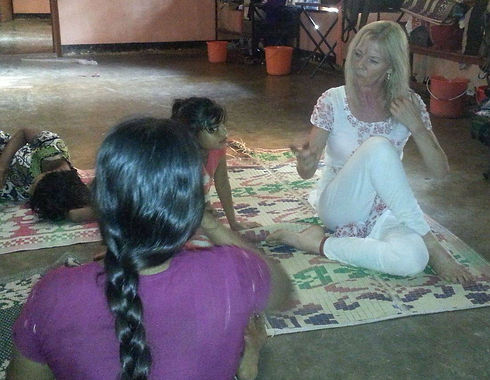
GOODNESS, ART, MUSIC,
DANCE, YOGA, NATURE
YOGA
YOGA
Director Rebecca Bachar began studying, practicing, and a few years later teaching Vedic studies: Yoga, meditation for 45 years, since age 16 (1979), Ayurveda the ancient system of medicine from India, based on restoring balance in the body and uses diet, herbs, and yogic breathing. and Vedic Science since 1986.
At Temple Studio we teach basic beginner to advanced Hatha Yoga; Vedic (ancient) Yoga Asanas, Surya Namaskar (Sun Salutations), Pranyama (Breathing Techniques), Yoga Mudras and Nadi (Pulse Diagnosis), and Ayurveda ( ancient Indian Healing and herbal medicine).
Yoga by its true meaning and in its entirety, is a comprehensive group of physical, mental, and spiritual practices or disciplines which originated in ancient India. The development of yoga has been definitively traced back to over 5,000 years ago. Many researchers think that yoga may be over 10,000 years old old. Yoga's long rich history can be divided into four main periods of innovation, practice and development. There is a broad variety of yoga schools, practices, and goals. The most popular and common in the west being Hatha Yoga.
Hatha is a Not specific type of yoga, like Ashtanga or Iyengar. Hatha Yoga actually describes all the physical practices of yoga. It is a very general term which has come to be used interchangeably with "yoga". When you do Ashtanga yoga, you are doing a form of Hatha. When you do Iyengar yoga, you do Hatha.
Adult Classes Group & Private
Call for details or to Schedule your 1st FREE Private Session w Rebecca


Children';s Classes
Call to schedule a FREE Lesson
Mom or Dad & Child Classes
Call for details and to reserve your place....

Our Recent Work
Yoga kids- boys
Yoga kids- boys
Private Yoga Class
Private Yoga Class
Isadora Duncan and Yoga
It was a dream and goal of Isadora Duncan to journey to India.
Isadora's personal library contained many books on Yoga and meditation
Isadora wrote of Yoga in a letter to the famous English theatre practitioner Edward Gordon Craig. Duncan wrote of her difficulty in sitting still while meditating, and described the capabilities of yogis as “beyond nature.” She writes, “Well, unless one can be a Yogi, one must live according to one’s nature—only the Yogi lifts above all and I haven’t yet heard of a woman Yogi” (ed. Francis Steegmuller, “Your Isadora:” The Love Story of Isadora Duncan and Gordon Craig).
Isadora said "I am a Yogi of the epicurean school"
Vedic Knowledge: Introduction
ॐ पूर्णमदः पूर्णमिदं पूर्णात्पूर्णमुदच्यते ।
पूर्णस्य पूर्णमादाय पूर्णमेवावशिष्यते ॥
ॐ शान्तिः शान्तिः शान्तिः ॥
Om Puurnnam-Adah Puurnnam-Idam Puurnnaat-Puurnnam-Udacyate |
Puurnnasya Puurnnam-Aadaaya Puurnnam-Eva-Avashissyate ||
Om Shaantih ||
All this is full. All that is full. From fullness, fullness comes. When fullness is taken from fullness, fullness still remains. Peace
Veda means to Know, Knowledge. The Vedas is not Hinduism. The greatest concentration of the Vedic Tradition deals more with knowledge versus belief. Ayurveda Medicine, healthy living, meditation, yoga, Sanskrit, and Vastu/Healthy buildings etc., all come from Vedic knowledge. Hinduism developed in India as a religion but Vedic knowledge is more fundamental and universal to all.
The core understanding of Vedic Knowledge is- Consciousness is the only reality. You are consciousness. All knowledge emerges from consciousness, is structured in consciousness. The Universe, including ourselves, exists in consciousness.
Meditation is a route, a way to experience more fully our own consciousness, the greater universal consciousness and the nature of consciousness.
Vedic Knowledge provides answers to all unanswered questions i.e why there is pain and pleasure, rich and poor, healthy and sick; God - His qualities, nature and works. Soul – Its nature and qualities, souls of humans and animals; reincarnation – how does it happen, why one is born as he or she is. What is the purpose of life? What we ought to do?
The four main texts in the Vedic tradition are Rigveda · Atharvaveda · Yajurveda Samaveda
They correspond to the four directions in the mind completing the cosmic circle of universal knowledge. The oldest of the Vedas, the Rigveda, is focused on cosmic structure.
“Vedas are the most rewarding and the most elevating book which can be possible in the world.” Arthur Schopenhauer
The Veda texts state that truth, non-violence, patience, penance and spiritual uplift are the foundations of a human life. The Upanishads are largely philosophical works, some in dialogue form. They are the foundation of Hindu philosophical thought and its diverse traditions. Of the Vedic corpus, they alone are widely known, and the central ideas of the Upanishads are at the spiritual core of Hindus.
Questions and points for contemplation and discussion:
What is consciousness?
What is knowledge?
. Karma
. Astrology
. Reincarnation
"Pashya me yogam aishvaram- Behold the richness of My Divine Nature"
“The kingdom of God is within you” (Luke 17:21, KJV)?
"Whatsoever a man soweth, that shall he also reap". Bible, Galatians VI
"For the soul there is neither birth nor death at any time. He has not come into being, does not come into being, and will not come into being. He is unborn, eternal, ever-existing and primeval. He is not slain when the body is slain." (Bhagavad Gita 2.20)
"The soul can never be cut to pieces by any weapon, nor burned by fire, nor moistened by water, nor withered by the wind.(Bhagavad Gita 2.23)
"The important thing is this, is to be able, at any moment, is to sacrifice what we are for what we can become" Maharishi Mahesh Yogi